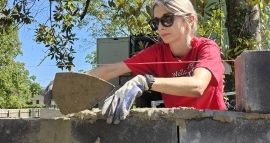COPING WITH COVID: MassMutual S.C.
Staff //April 16, 2020//
Coping with COVID
SC Biz News is speaking with small businesses and community leaders about the impact of the new coronavirus on business and industry, and how this is changing how they operate.
Contact Andy Owens, aowens@scbiznews.com, with any questions or ideas.
When Ry Hudnall, the owner of MassMutual S.C., saw the COVID-19 outbreak rolling across South Carolina, he had several considerations: Keeping 110 financial advisers serving customers, ensuring the safety of 20 local staff members, and what to do with brick-and-mortar locations across the state.
 “We spent two full days. Our IT guy was on fire,” Hudnall said. “Then we did it, and everybody was working from home.”
“We spent two full days. Our IT guy was on fire,” Hudnall said. “Then we did it, and everybody was working from home.”
He said when the initial scare rippled through the financial services industry, firms all across the country were closing. Hudnall operates under the MassMutual name, but his company is locally owned like any small business.
“We got notification that we were an essential business,” he said, but he knew that it was important to have someone at his office to put money into the economy. “We do have to be open to get the mail to put in the market. I went to a kind of Team 1, Team 2 model.”
The split office model is something a lot of essential businesses have chosen during the COVID-19 outbreak. By rotating different segments of their staff into the office on different days, it allows them to space out their proximity, serve customers and support staff. MassMutual is using a small office crew with a big sign on the door.
“We’re not open to the public and anybody who has symptoms or has been out of country,” Hudnall said. “Frankly, I’m concerned. I like a good firm handshake, but I believe those things might be gone for good. It’s going to change the way that people socially interact.”
Hudnall said COVID-19 has accelerated a lot of changes in a very short time in the insurance and investment side of financial advising. For example, insurance policies are being underwritten without blood or urine tests, which is a big change because people can’t have the typical exams that were required.
On the investment side of the business, Hudnall said a lot of adjustments have had to be made to the company’s communications model. Documents can’t be signed in person and the one-on-one meetings that now have to be done online have changed how the company prospects for business.
“This is a sales business,” he said. “Our advisers are having to run all of their meetings virtually. What was once a very high-touch business is being done on a cell phone.”
Hudnall said that some advisers are thriving in the new environment because more people are at home and available.
“Our most successful advisers are keeping more meetings as a result of being able to stay put,” he said.
“For the first time ever in my professional career, over-communication is a good thing. There are so many changes on a daily business on things we can and cannot do,” he said. “Everyone is working remote. We don’t have the same opportunity for a minute in the hallway. I’m actually busier. It’s wild.”
Hudnall said the financial services industry was seeing a transition even without the COVID-19 outbreak as people were looking to move money into different investment vehicles depending on the political, economy and business climate they find themselves experiencing.
“This is the nature of our industry. It’s not necessarily corona, but because of coronavirus, people are starting to look at safer types investment vehicles,” he said. “People have panicked and pulled a lot of money out of their investments. For clients who have money, they’re repositioning it to safer strategies. We can do both.”
He said from a strategic standpoint, businesses must make sure they understand what the new government support programs are offering.
“Don’t think it’s going to come to you,” he said. “You have to proactively go out and find the information. I think $2 trillion is going to go pretty quick.”
Hudnall said his advice for small businesses is also more philosophical rather than strategic.
“I think the biggest thing we can do is think big and look for the silver linings because they are all over the place,” he said. “If we look for them, then we can take what is probably a negative thought and turn it into a positive. We can truly change our thinking.”
T















